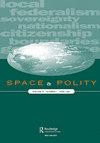宗派的,娱乐的,还是反社会的?解读冲突后贝尔法斯特的青少年暴力
IF 1.1
Q2 GEOGRAPHY
引用次数: 0
摘要
2018年和2019年,在北爱尔兰贝尔法斯特,来自联合派和民族主义社区的青少年群体的街头暴力事件重新浮出水面。为了解释这一问题在同时期北爱尔兰的持续存在,我将重点放在当地行动者在评估这一公共问题的性质时所面临的障碍上。我回到“娱乐性骚乱”的概念,以及它的批判是如何导致关于这些行为是否具有政治性的辩论的:这种悬而未决的争议是管理青少年暴力的僵局的特征。我认为,这种情况揭示了联合主义者和民族主义者社区之间日益相互依赖的一个临界时刻。作者感谢Marine Boisson, Colin Coulter, Dominique Linhardt,审稿人和编辑在撰写本文期间的细心阅读和建议。披露声明作者未报告潜在的利益冲突。注1尽管遵循不同的理论传统,但这些作者对现代社会特征的日益融合和分化的过程有着共同的兴趣,使他们特别关注这种类型的紧张关系。作者简介thsamo Leschevin thsamo Leschevin是爱尔兰梅努斯大学和法国社会科学高级研究学院的社会学博士。他目前是人类科学基金会(FMSH)的博士后研究员,是ANR TROC(恐怖分子在公开拘留中的重新融入)研究项目的一部分。本文章由计算机程序翻译,如有差异,请以英文原文为准。
Sectarian, recreational, or anti-social? Interpreting juvenile violence in post-conflict Belfast
ABSTRACTIn North Belfast, in 2018 and 2019, street violence involving groups of teenagers from unionist and nationalist communities resurfaced. To explain the persistence of this problem in contemporaneous Northern-Ireland, I focus on the obstacles local actors face when assessing the nature of this public problem. I return to the notion of ‘recreational rioting’, and how its critique led to debates on whether those behaviours were political or not: this unsettled controversy characterises the stalemate in the management of juvenile violence. I argue that this situation reveals a liminal moment in increasing interdependencies between unionist and nationalist communities.KEYWORDS: Youthviolencerecreational riotingNorthern Ireland AcknowledgementsThe author thanks Marine Boisson, Colin Coulter, Dominique Linhardt, the reviewers and the editor for their attentive readings and their advice during the writing of this article.Disclosure statementNo potential conflict of interest was reported by the author(s).Notes1 Though following different theoretical traditions, these authors shared an interest for the processes of increasing integration and differentiation characterising modern societies, rendering them especially attentive to this type of tension.Additional informationNotes on contributorsThéo LeschevinThéo Leschevin is a PhD in Sociology from Maynooth University, Ireland, and the School for Advanced Studies in Social Sciences, France. He is currently a postdoctoral researcher with Fondation Maison des Sciences de l'Homme (FMSH) as part of the ANR TROC (Terrorists Reintegration in Open Custody) research program.
求助全文
通过发布文献求助,成功后即可免费获取论文全文。
去求助
来源期刊

SPACE AND POLITY
GEOGRAPHY-
CiteScore
4.10
自引率
4.20%
发文量
19
期刊介绍:
Space & Polity is a fully refereed scholarly international journal devoted to the theoretical and empirical understanding of the changing relationships between the state, and regional and local forms of governance. The journal provides a forum aimed particularly at bringing together social scientists currently working in a variety of disciplines, including geography, political science, sociology, economics, anthropology and development studies and who have a common interest in the relationships between space, place and politics in less developed as well as the advanced economies.
 求助内容:
求助内容: 应助结果提醒方式:
应助结果提醒方式:


